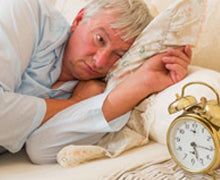
You can add another important aspect of health to the list of factors affected by the gut microbiome now that Japanese researchers have linked it to sleep. Researchers found mice with depleted gut bacteria had trouble producing serotonin which they believe led to difficulty sleeping.
Professor Masashi Yanagisawa at the University of Tsukuba in Japan and his colleagues wanted to study the impact of impaired gut function on food and sleep. They started with a group of healthy mice and gave some a powerful antibiotic cocktail to deplete their normal intestinal microorganism composition.
The mice were then given the same diet and researchers compared the resulting contents in their intestines from the digestion process. Food during digestion is broken down into small bits and pieces called metabolites. Scientists found significant differences between the metabolites in the microbiota-depleted mice and the control group.
"We found more than 200 metabolite differences between mouse groups,†Yanagisawa said. “About 60 normal metabolites were missing in the microbiota-depleted mice, and the others differed in the amount, some more and some less than in the control mice."
Researchers then set out to determine what the missing metabolites normally do and found the mice given the antibiotics lacked the ability to produce some neurotransmitters. Those are the molecules that cells in the brain use to communicate with each other.
One glaring difference was in the tryptophan-serotonin pathway. It was almost totally shut down in the mice given antibiotics. Even though those mice had high levels of tryptophan they had almost no serotonin, which meant they were not able to produce serotonin from the tryptophan they were eating.
The study mice were also deficient in vitamin B6 metabolites which are thought to accelerate the production of important neurotransmitters like dopamine.
The link to sleep was found when they looked at the brain activity in EEGs. The found the mice given antibiotics had more REM and non-REM sleep at night when the mice are supposed to be active. They also had less non-REM sleep during the day when they are supposed to be sleeping. In a sense, the microbiota-depleted mice switched between sleep and wake stages more frequently than the other mice.
Yanagisawa believes the lack of serotonin was the cause of the sleep abnormalities. "We found that microbe depletion eliminated serotonin in the gut, and we know that serotonin levels in the brain can affect sleep/wake cycles," he said. "Thus, changing which microbes are in the gut by altering diet has the potential to help those who have trouble sleeping."



